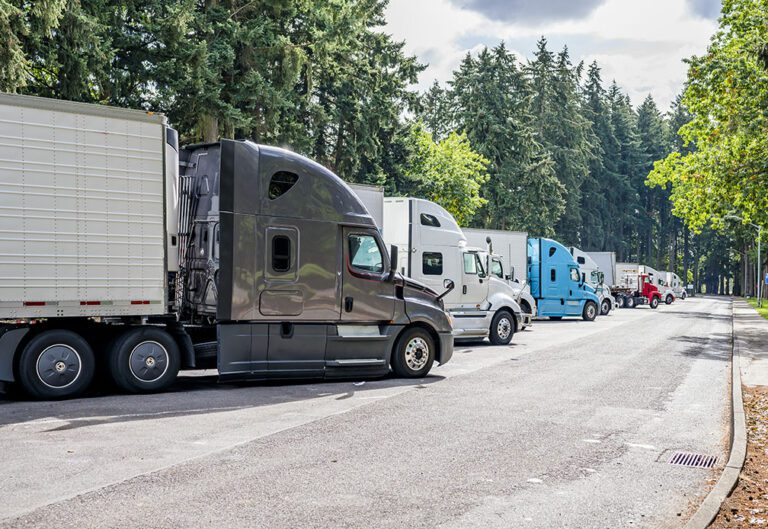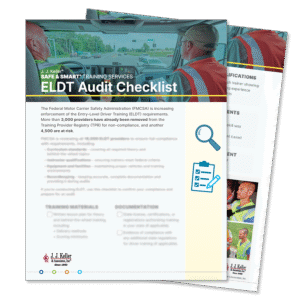There’s been a lot in the news lately about truck parking, and several proposals have been put forth that would use government money to build more truck parking. Unfortunately, those efforts will take some time to come to fruition.
It doesn’t take long for a new driver to learn that parking an 18-wheeler is a lot different than pulling the family car into a parking space at Walmart. Experienced truckers give themselves all the advantages they can by planning ahead for parking and following a few simple guidelines.
No parking plan is foolproof, of course. Even the best of them can be thwarted when construction or other delays prevent you from reaching your planned parking spot or you arrive to find every slot taken. It’s all about increasing your chances of finding safe parking.
With the use of routing apps and GPS, some drivers have gotten away from trip planning altogether. Sometimes, those are the unfortunate drivers you see in the news after they’re caught driving along a goat trail through the mountains, or perhaps stuck under a too-low bridge. The ones you don’t see in the news end up violating their hours of service in a frustrating search for an available parking space, or they park illegally on ramps or highway shoulders.
Even in this digital age, trip planning is not a lost art; it is still a necessity. Every driver should have a good idea of the day’s route and stopping point. Some drivers still check GPS routing against an old-fashioned road atlas. Others rely on apps and GPS units, but make sure the software is designed for trucking.
Popular apps like Trucker Path, Park My Rig and ParkMate are easy to find and download. A search of Apple or Google apps will return plenty of choices. Most of the truck stop chains have their own apps, too. You can use them to reserve parking spaces, check fuel prices and find out what restaurants are at each location.
Paid parking is becoming more common and is one of the choices you’ll have. Some truck stops allow use of fuel card points to pay for parking or at least get a discount. Check your options carefully.
Mapping programs that offer satellite views are useful for seeing what businesses are located around your planned exit. You may be able to walk to a favorite store or restaurant from your parking spot, or you may plan a stop at another location before you park for the night.
While planning, keep in mind that the best places to eat and shower are often the most popular for parking, too. You may need to get there earlier in the day to find a parking spot. Be wary of parking in the end spot or in no-parking areas; tired truck drivers navigating through crowded truck stops can accidentally hit your truck or trailer.
Because property values in urban areas can be high, truck stops are often built away from or on the outskirts of town. If your plan is to look for a parking place when you get close to your delivery point, keep in mind that the closer you get to the city, the less likely it is you’ll find a truck stop. Unless you’re sure of a parking place closer in, it’s better to start looking at least an hour away from your destination.
While some facilities allow truck parking on their property or nearby, never assume that’s the case. Always call and ask if you’ll be able to park there and for how long.
Some drivers prefer parking in less crowded surroundings and look for alternatives other than truck stops. One alternative is the parking lot at a large store. Be careful if this is your choice, even if the spot seems abandoned. Often, the store is located on a leased property not owned by the retailer. The real owner may have a no-truck parking policy, and they may — or may not — have posted signs.
Additionally, some towns or counties have ordinances against truck parking. Drivers have been awakened by officers issuing citations. In addition, some drivers have been victimized by predatory towing services that may use a “boot” or chains and locks to make the truck undrivable, releasing it only after receiving payment of exorbitant fees. Be sure to get permission to park in the lot and make sure whoever you get it from actually speaks for the owner.
Some drivers prefer parking on the shoulder of Interstate ramps. This can be a dangerous practice and can expose the truck and driver to crashes — and it’s often illegal, too. If this is your only choice, make sure there are no signs prohibiting parking, and choose a spot where traffic is moving more slowly. The beginning portion of an on ramp is usually safest because traffic is usually slower.
Be aware that some places have “sitting duck” policies that prohibit parking on the shoulder of the road anywhere. A citation for exceeding your driving hours may be preferable to losing your job, so make good decisions.
Don’t neglect security for yourself, your truck and your cargo when choosing a parking spot. Well-lit parking lots with others around offer less chance of being robbed or assaulted. Backing so the trailer doors are close to a building, wall or even another truck can discourage thieves from breaking into the trailer. Parking in dark, secluded areas may be quieter but it offers less protection.
Make sure your doors are locked when you’re in the cab. Some drivers increase their security by using a strap to hold the doors together so that if a lock is defeated the doors still can’t be opened.
When leaving the cab, always use the windows and mirrors to look all around the truck. When returning to the truck, get a look underneath and make sure no one’s hiding behind the cab. If you notice the door has been opened, a window broken or anything else suspicious, do not get in the cab. Call the police or truck stop security instead.
There is no guarantee safe parking will be available every time you need it, but you’ll improve your odds by including parking in your trip plan.
Cliff Abbott is an experienced commercial vehicle driver and owner-operator who still holds a CDL in his home state of Alabama. In nearly 40 years in trucking, he’s been an instructor and trainer and has managed safety and recruiting operations for several carriers. Having never lost his love of the road, Cliff has written a book and hundreds of songs and has been writing for The Trucker for more than a decade.













